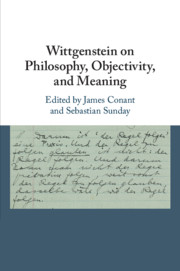Book contents
- Wittgenstein on Philosophy, Objectivity, and Meaning
- Wittgenstein on Philosophy, Objectivity, and Meaning
- Copyright page
- Contents
- Contributors
- Preface
- Acknowledgments
- Chapter 1 Anatomy of a Muddle: Wittgenstein and Philosophy
- Chapter 2 Explaining What We Mean
- Chapter 3 Objectivity
- Chapter 4 The Methodological Significance of Intuitions in Philosophy
- Chapter 5 Wittgenstein on ‘Seeing Meanings’
- Chapter 6 Bringing the Phenomenal World into View
- Chapter 7 First Steps and Conceptual Creativity
- Chapter 8 Wittgenstein and Analytic Revisionism
- Chapter 9 Demystifying Meaning in Horwich and Wittgenstein
- Chapter 10 What Is Meaning? A Wittgensteinian Answer to an Un-Wittgensteinian Question
- Chapter 11 Meaning, Use, and Supervenience
- Chapter 12 Some Socratic Aspects of Wittgenstein’s Conception of Philosophy
- References
- Index
Chapter 2 - Explaining What We Mean
Published online by Cambridge University Press: 15 August 2019
- Wittgenstein on Philosophy, Objectivity, and Meaning
- Wittgenstein on Philosophy, Objectivity, and Meaning
- Copyright page
- Contents
- Contributors
- Preface
- Acknowledgments
- Chapter 1 Anatomy of a Muddle: Wittgenstein and Philosophy
- Chapter 2 Explaining What We Mean
- Chapter 3 Objectivity
- Chapter 4 The Methodological Significance of Intuitions in Philosophy
- Chapter 5 Wittgenstein on ‘Seeing Meanings’
- Chapter 6 Bringing the Phenomenal World into View
- Chapter 7 First Steps and Conceptual Creativity
- Chapter 8 Wittgenstein and Analytic Revisionism
- Chapter 9 Demystifying Meaning in Horwich and Wittgenstein
- Chapter 10 What Is Meaning? A Wittgensteinian Answer to an Un-Wittgensteinian Question
- Chapter 11 Meaning, Use, and Supervenience
- Chapter 12 Some Socratic Aspects of Wittgenstein’s Conception of Philosophy
- References
- Index
Summary
This essay argues that the logical significance of most natural language expressions is indefinitely elastic. This, it is argued, undermines the idea that the meaning of a word is an item for which it stands, and puts pressure on the methods of conceptual analysis and theoretical elucidation that require context-invariant stable application conditions. Furthermore, it is argued that the insistence that such semantic content is needed which—impervious to local pragmatic concerns—remains stable and available for reasoning, gets things back to front. For in order to determine the correct inflection of any given use of an expression, its inferential relations—in the context of an utterance—must already be discerned. The lack of contextually independent content, however, presents no mystery about language use. For the ability to understand what is said is explained not only by shared practices and common interests, but also by the capacity for interlocutors to ask questions and explain what they mean.
Keywords
- Type
- Chapter
- Information
- Wittgenstein on Philosophy, Objectivity, and Meaning , pp. 28 - 46Publisher: Cambridge University PressPrint publication year: 2019

